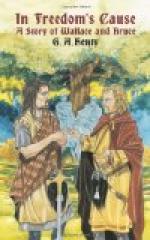Galloway had risen again, and Edward Bruce, with Sir Archie Forbes, was detached to reduce it. It was a hard task, for the local chiefs were supported by Sir Ingram de Umfraville and Sir John de St. John; these knights, with 1200 followers, met the Scots on the banks of the Cree, which separates the countries of Kirkcudbright and Wigton, and although greatly superior in numbers, were completely defeated by the Scottish pikemen, and compelled to take refuge in the castle of Butele. Edward Bruce and Archie continued the task of subjugating the country; but St. John having retired to England, returned with fifteen hundred men-at-arms, and with this strong force set out in pursuit of the small body of Scots, of whom he thought to make an easy capture. Then occurred one of the most singular and brilliant feats of arms that took place in a war in which deeds of daring abounded. Edward Bruce having heard from the country people of the approach of his adversaries, placed his infantry in a strong position, and then, with Archie Forbes and the fifty men-at-arms who constituted his cavalry, went out to reconnoitre the approach of the English. The morning was thick and misty. Ignorant of each other’s position, the two forces were in close vicinity, when the fog suddenly lifted, and Edward Bruce and Archie beheld close to them the overwhelming force of St. John, within bowshot distance. It was too late to fly. Edward Bruce exclaimed to Archie:
“There is nothing for it but to charge them.”
“Let us charge them,” Archie replied.
The two leaders, setting spurs to their horses, and closely followed by their fifty retainers, dashed like a thunderbolt upon the mass of the English men-at-arms, before these, taken equally by surprise, had time to form, and burst clean through them, overthrowing and slaying many, and causing the greatest confusion and surprise. Riding but a short distance on, the Scots turned, and again burst through the English lines. Numbers of the English were slain, and many others turned rein. A third time the Scots charged, with equally fatal effect. The English were completely routed. Many were killed and many taken prisoners, and the rest rode for England at their best speed. History scarcely recalls another instance of 50 men routing in fair fight 1500. This extraordinary success was followed by a victory over Sir Roland of Galloway and Donald of the Isles on the banks of the Dee, the Lord of the Isles being made prisoner; and eventually the whole country was reduced to obedience, with the exception of one or two garrisons, no less than thirteen castles being captured, in addition to the victories gained in the field.




